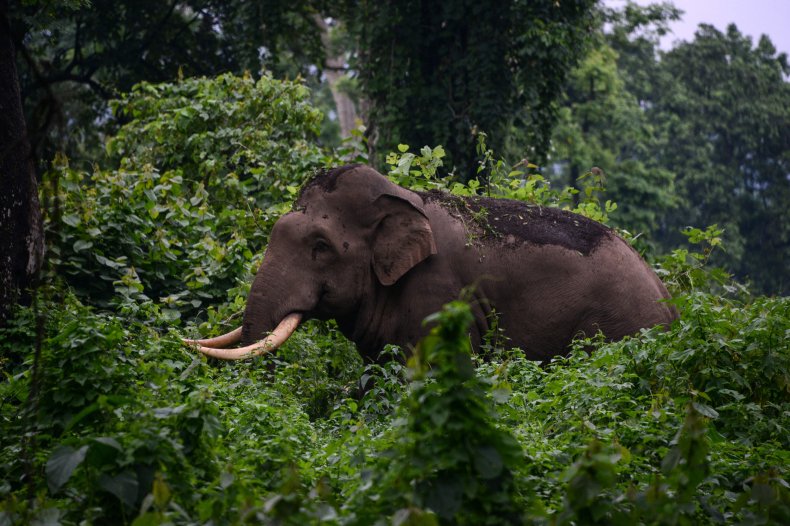An elephant that killed a woman in India returned to her funeral and trampled on her corpse, local police have said.
The 70-year-old woman, Maya Murmu, was attacked by the wild elephant as she walked to collect water in Odisha’s Mayurbhanj district, Indian news outlet The Print reported.
The elephant had strayed from the Dalma Wildlife Sanctuary, which lies about 10 miles from the city of Jamshedpur.
After the elephant attacked Murmu, she was rushed to hospital, but she succumbed to her injuries, Lopamudra Nayak, an inspector at the Rasgovindpur police station, told The Print.
Later, as family members gathered to perform a funeral for Murmu, the wild tusker appeared once again.
It approached the pyre and grabbed the body, The Print reported. The elephant then trampled on her body again, and threw it away before fleeing.
The funeral was completed a few hours later.
Duncan McNair, a lawyer and founder of conservation charity Save The Asian Elephants, told Newsweek that this incident is a reminder that although gentle creatures, elephants can be “dangerous and deadly.”
However, McNair said these incidents rarely happen without the elephant having been provoked in someway. “These endangered elephants can be deadly dangerous, particularly when provoked or abused,” he said.

DIPTENDU DUTTA/Getty
He said that Asian elephants are particularly subject to “torture and stabbing” for easy use in the tourism industry.
“Elephants are generally benign, and passive … they don’t rush out of nowhere to attack people that pose no threat to their safety, or babies or to anything like that,” he said. “[This incident] is surprising because it shows no provocation of the elephant…”
McNair said the elephant coming back and handling the body during the body, could be down to their “extraordinary cognitive abilities.”
“It’s just possible that if [the elephant] was in proximity still at the time of the funeral, and that’s not clear, that it will have recognised the remains. And it may have seen or smelled that and it may have associated that woman with some catastrophe to it or it’s herd. That is quite possible,” he said.
Conflict on the Rise
Human and elephant conflict is on the rise across the world because the loss of the animals’ natural habitat is forcing elephants into closer proximity with residential areas.
Climate change is also making life harder for elephants. As the temperature increases, water sources are more likely to dry up, causing elephants to hunt out new resources, and this can cause them to come into contact with humans. Odisha’s Mayurbhanj district has suffered severe droughts in recent years.
Fragmented habitats can cause “crop raiding” instances, when elephants stray onto farmlands in search of food and water, ruining growing crops as they do so.
In May, an Indian farmer was trampled to death by a wild elephant. The elephant and its herd had wandered onto farmlands.
The herd of 11 elephants strayed into the field near a village in Andhra Pradesh’s Chittoor district during the night. The man who was attacked had been guarding the field, The Hindu Times reported.
The farmer died instantly after being trampled, the news outlet said.
While they are known for being gentle giants, elephants can attack humans when they feel vulnerable, or if their territory is being threatened.
According to the World Wildlife Fund (WWF), these kinds of instances can cause elephants to be seen as a nuisance. In one 2001 case, 60 elephants were found dead—poisoned by farmers—across parts of India and Sumatra.
It still isn’t clear why the elephant that attacked Maya Murmu had strayed from the Dalma Wildlife Sanctuary.
The sanctuary, which operates as a safari park, is “very much favored” by Asian elephants because of the abundance of water within it, “even during summer,” according to the Forest Department.
Newsweek has contacted the local forest department and police for comment.
Update 6/13/22 08.00 a.m ET: This article was updated to include quotes from Duncan McNair
